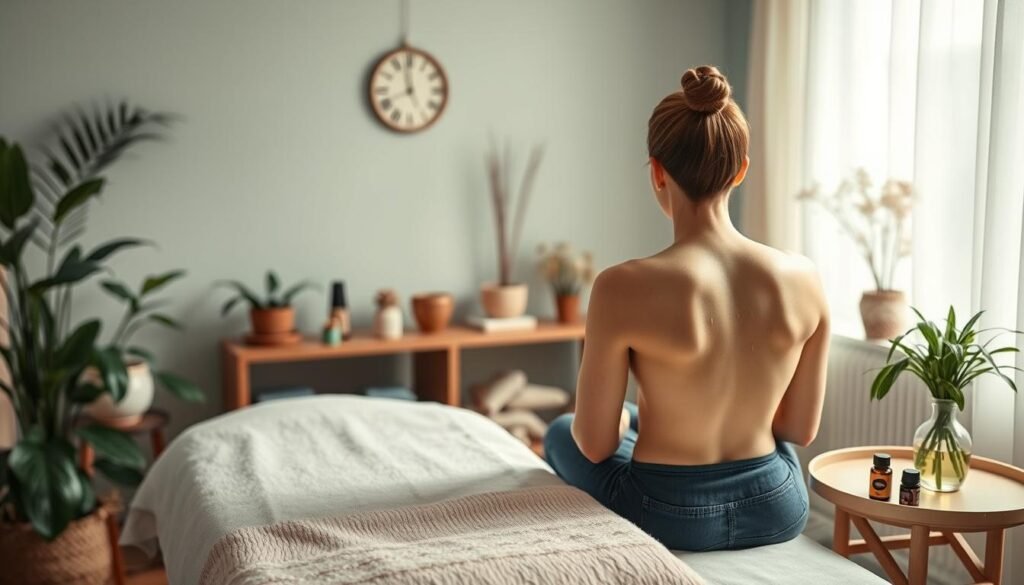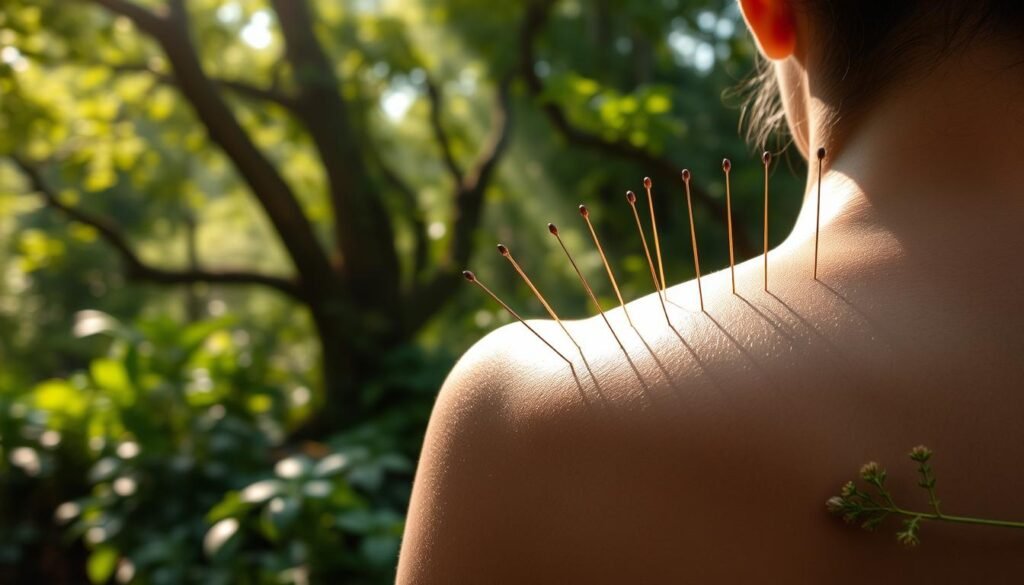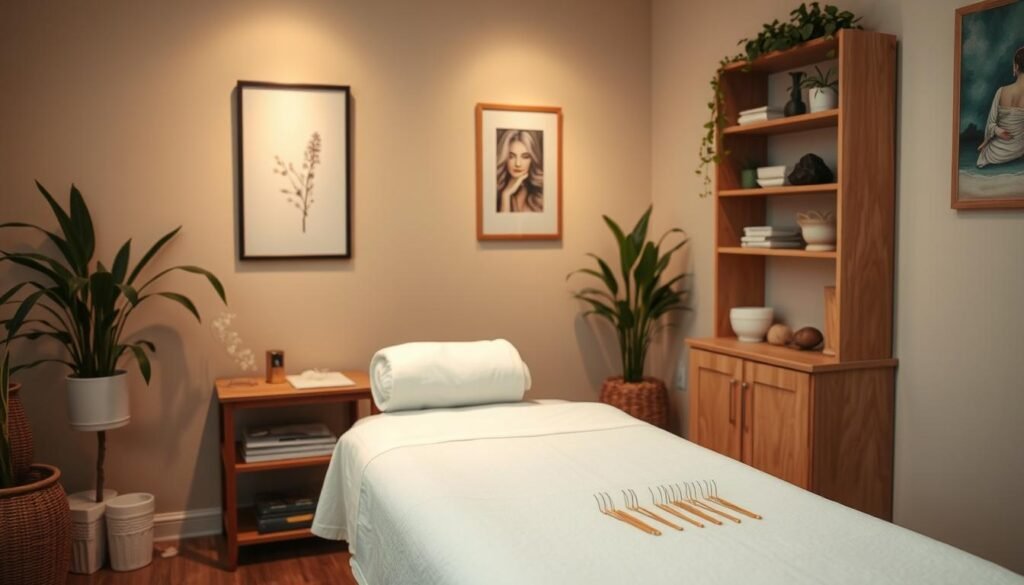About 7.6% of people in China experience anxiety, the country’s top mental health issue. More people worldwide are trying alternative ways to handle anxiety. Acupuncture is noteworthy among these. It’s an ancient Chinese practice that may reduce anxiety symptoms in today’s stressful times, like during pandemics.
Studies reveal acupuncture boosts our natural happy hormones and cuts down stress hormones such as cortisol. This suggests anxiety treatment through acupuncture might be effective with fewer negatives than drugs. Those looking into natural healing could see benefits to their mood and overall health from acupuncture.
Interested in how acupuncture might help with anxiety? Find out about its role in easing anxiety symptoms and boosting relaxation.
The demand for stress relief methods is increasing. It’s important to see how acupuncture can aid mental health, along with traditional approaches.
Key Takeaways
- Acupuncture may help reduce anxiety symptoms through the stimulation of feel-good hormones.
- It’s gaining recognition as a safe alternative treatment for various anxiety disorders.
- Research indicates acupuncture can effectively lower cortisol levels, a stress hormone.
- For optimal results, acupuncture can complement other methods of anxiety relief, such as therapy and medication.
- Finding a licensed acupuncturist is crucial for safe and effective treatment.
- A growing body of evidence supports the efficacy of acupuncture as a holistic healing option.
Understanding Anxiety and Its Impact
Anxiety affects millions globally, leading to daily disruptions. It’s part of several disorders, such as generalized anxiety disorder (GAD). In the US alone, GAD affects 15.7 million people each year. Knowing about anxiety’s causes and triggers is critical. It helps in finding the right treatment to manage anxiety effectively.
About one-third of patients don’t get better with common treatments like drugs and therapy. So, they turn to alternatives like acupuncture. This option tries to improve well-being in a way that’s different from traditional methods.
Women tend to struggle more with anxiety and depression than men. Their rates are roughly twice as high. Anxiety and depression often come back, with relapse rates near 50%. This shows the need for varied and effective treatments. Acupuncture shows promise by boosting endorphins and fighting inflammation. It might help both mind and body. Though more proof is needed, its use in treating anxiety is growing.
| Statistics | Details |
|---|---|
| Anxiety disorder prevalence | Affects 30 million Americans at some point in their lives. |
| Major depressive disorder lifetime incidence | Approximately 18%, more common in women. |
| Acupuncture effectiveness | Shown to relieve generalized anxiety disorder symptoms after eight weeks of treatment. |
| Relapse rates for anxiety and depression | Approach 50%, necessitating robust treatment methods. |
Knowing these facts helps create better treatment plans for anxiety. People keep looking for relief, which leads them to acupuncture. This method offers a comprehensive approach. It not only fights anxiety but also boosts overall health.
The Basics of Acupuncture
Acupuncture is a key part of traditional Chinese medicine. It aims to bring harmony to the body. This is done by inserting thin needles at certain points to improve energy flow, known as ‘qi’. This old method believes that health problems, like anxiety, are due to energy issues.
For those dealing with anxiety, acupuncture offers a natural solution. It works by focusing on specific points linked to anxiety. This helps balance the body’s chemicals and calms the mind. It’s a way to treat emotional upset while boosting overall health.
In the U.S., many people suffer from anxiety, including adults and kids. There are different types of anxiety disorders. For example, generalized anxiety disorder, obsessive-compulsive disorder, and social anxiety disorder. Some find relief in medication, but acupuncture is a strong, natural choice.
How often you need acupuncture varies. Some may go once or twice a week, depending on their anxiety levels. Research shows it can help ease anxiety symptoms. It supports the idea that acupuncture is a good addition to mental health treatment. It gives people a way to manage their anxiety naturally and safely.
| Aspect | Details |
|---|---|
| Origins | Key component of traditional Chinese medicine |
| Method | Insertion of fine needles into specific pressure points |
| Energy Concept | Facilitates flow of energy (‘qi’) |
| Targeted Issues | Includes anxiety along with various physical ailments |
| Session Frequency | Typically 1-2 times per week |
| Effectiveness | Can alleviate symptoms compared to conventional treatments |
Does Acupuncture Help With Anxiety?
Many wonder if acupuncture can ease anxiety. Both medical research and popular opinion support its benefits. A major review of 20 studies showed acupuncture can lower anxiety more than other treatments do. This news is exciting for anyone looking for natural ways to fight anxiety.
Research on Acupuncture’s Effects on Anxiety
Studies on acupuncture are revealing its mental health advantages. Some research shows it’s as good as, or better than, drugs for anxiety. This points to acupuncture as a key method for dealing with anxiety naturally. Acupuncture treatments are sessions of peace lasting 20 to 40 minutes. Finding a good acupuncturist can be easier with a recommendation. All acupuncturists should have a license, checkable through the NCCAOM.
How Acupuncture Stimulates Relaxation Responses
Acupuncture activates the brain’s calm signals. It helps release chemicals that make us feel good and stable. Besides treating anxiety’s physical effects, acupuncture improves sleep, crucial for anxiety sufferers. Points like Yintang and Shenmen are especially good for calming and anxiety reduction. This makes acupuncture a strong choice for those avoiding drugs. With regular sessions, it can offer ongoing relief from anxiety.
Exploring the Benefits of Acupuncture for Anxiety Treatment
Acupuncture is great for those with anxiety. It helps both your body and emotions. Studies show it lowers stress hormones, like cortisol. Lowering these hormones can reduce anxiety and help you feel calm.
Reduction of Stress Hormones
Acupuncture is known to cut down stress hormones. High cortisol levels link to anxiety. Acupuncture can lower these hormones. This helps balance your body and mind. It offers a safe way to manage anxiety without medication side effects.
Boosting Feel-Good Hormones
Acupuncture also increases endorphins and serotonin. These hormones boost mood and well-being. Endorphins ease pain. Serotonin, the “happy hormone,” helps with mood. By raising these hormones, acupuncture fights anxiety and boosts happiness. It’s great for overall mental health.

| Benefits of Acupuncture | Effects on Anxiety |
|---|---|
| Reduction of Cortisol | Decreases anxiety symptoms and promotes relaxation |
| Release of Endorphins | Acts as a natural painkiller and mood enhancer |
| Boosting Serotonin | Elevates mood and emotional well-being |
| Minimal Side Effects | Safe alternative to traditional anxiety medications |
| Supports Immune Function | Enhances overall health and resilience against stress |
Traditional Chinese Medicine and Anxiety
Traditional Chinese medicine views anxiety as an energy flow problem, not just a mental health issue. It takes a holistic approach, linking mind and body. Acupuncture is key, aiming to ease emotional pain by targeting certain points.
Along with acupuncture, herbal remedies are used. These herbs, like Ginkgo biloba and Chaihu, calm the mind and help with stability. For example, Chaihu can ease liver qi stagnation, which may cause anxiety.
The holistic approach of traditional Chinese medicine focuses on personal treatment plans. This method looks at each patient’s unique needs, combining acupuncture, herbs, and lifestyle changes. Thus, it can greatly help those with anxiety and emotional issues.
Traditional Chinese medicine has become popular worldwide for treating anxiety. It’s seen as a natural alternative to modern treatments, often with fewer side effects. Many are turning to traditional Chinese medicine for relief from anxiety’s increasing grip.
| Therapy | Description | Benefits |
|---|---|---|
| Acupuncture | Needle insertion at specific points | Redistributes energy, reduces anxiety, promotes relaxation |
| Herbal Remedies | Use of natural plant and mineral products | Targets specific symptoms of anxiety and promotes emotional balance |
| Qi Gong and Tai Chi | Gentle movement and breathing exercises | Enhances mind-body connection, reduces stress response |
| Dietary Therapy | Guidance on food choices for emotional health | Supports overall well-being and emotional stability |
Natural Remedies for Anxiety: Acupuncture as a Valuable Option
More people are turning to natural remedies to ease anxiety, with acupuncture standing out. This ancient method uses needles at certain points to help the body heal itself. It helps you relax and reduces anxiety.
Studies show acupuncture can help with anxiety symptoms like worry and tension. A 2018 study noted it’s safe and effective, particularly for those who don’t do well with usual antidepressants. Some feel better after just one session. Others need six to eight sessions for the best outcome.

Adding acupuncture to your anxiety treatment can work well with practices like yoga and meditation. It’s a holistic approach, improving both your mental and physical health. By triggering endorphin release, acupuncture aids in relaxation, better sleep, and a calmer mindset. Places like Amend Treatment use it alongside other therapies, catering to different needs.
Acupuncture is great, but it should accompany, not replace, traditional mental health treatments. Pairing it with medication and talk therapy creates a comprehensive anxiety management plan. For more on acupuncture’s benefits for anxiety, check out this article. It offers in-depth insights into its positive effects on anxiety disorders.
Integrating Acupuncture with Other Treatment Methods
Acupuncture, when combined with other therapies, boosts anxiety management. It’s been used for centuries, showing success in easing anxiety, depression, and stress. Pairing it with treatments like CBT or medications creates a fuller plan.
Many experts recommend acupuncture alongside other therapies. This mix can address both mental and physical health. The Alberta Complementary Health Integration Project had 606 patients. Those with combined treatments saw big improvements.
A closer look at 235 patients with at least 12 acupuncture sessions revealed:
| Outcome | Improvement (%) |
|---|---|
| Pain Severity | 75.5 |
| Sleep Quality | 53.1 |
| Depression | 78.4 |
| Anxiety | 41.1 |
| Fatigue | 43.7 |
| Anger | 38.2 |
| Overall Quality of Life | 42.6 |
These results highlight the powerful effect of combining acupuncture with other therapies. Licensed practitioners designed these treatments, which lasted from 1 to 3 months. They significantly improved mental health.
Combining acupuncture with traditional care greatly improves anxiety management. This holistic strategy offers personalized, effective help for those battling anxiety.
Acupuncture Points That Target Anxiety Symptoms
Acupuncture uses special points to help with anxiety. The Yintang point between the eyebrows and Heart 7 at the wrist are key. They calm the mind and stabilize emotions.
Yintang and Its Calming Effects
The Yintang, or “third eye,” is between the eyebrows. It’s known for its peace-bringing power. Activating it can drop anxiety levels, helping people stay calm before medical tests. Acupuncturists focus on the Yintang point to relieve anxiety.
Heart 7 for Emotional Stability
Heart 7 is found at the wrist. It’s vital for keeping emotions in check. Research shows it helps with panic and anxiety from substance use. It’s a key point for managing feelings and reducing anxiety. It’s great for improving emotional health through acupuncture.
| Acupuncture Point | Location | Primary Benefit | Related Research Findings |
|---|---|---|---|
| Yintang | Between the eyebrows | Calming effects | Reduces anxiety levels before medical procedures |
| Heart 7 | Wrist crease | Emotional stability | Effective for panic attacks and substance-related anxiety |
Potential Risks and Side Effects of Acupuncture
Acupuncture is known as a safe treatment option. Still, it’s important to know the risks of acupuncture and possible acupuncture side effects. Most times, severe problems don’t happen. Yet, some people might feel a bit of pain or discomfort where the needles go in. To lower these risks, make sure a trained professional does your acupuncture.
People sometimes feel dizzy or sleepy after acupuncture. You might also get a slight headache or feel like throwing up. These issues usually go away pretty fast. It shows why paying attention to how you feel during and after sessions is key. Always tell your acupuncturist about all your health issues.
Certain people, like those who are pregnant or have bleeding problems, need to be extra careful with acupuncture. They face more risks. Also, if needles aren’t clean, there could be an infection risk. But, trained acupuncturists use clean, one-time-use needles to avoid this.
The first time you go, they’ll ask about your health history. This is crucial for making a good treatment plan and avoiding problems. Acupuncture works best when used with other treatments. If you’re looking to handle stress better, try mindfulness or deep breathing. Learn more here.
| Potential Risks | Symptoms |
|---|---|
| Soreness/Bruising | Minor pain or discomfort at insertion sites |
| Dizziness | Feeling faint or lightheaded after treatment |
| Nausea | Some may feel nauseous post-treatment |
| Infection | Very rare when using sterile needles |
| Drowsiness | Occasional sleepiness following a session |
How to Prepare for Your First Acupuncture Session
Getting ready for your first acupuncture session is an important step. At the start, there’s usually a consultation. It lets the acupuncturist learn about your health history and symptoms.
Feeling nervous before your appointment is normal. A calming setting and a supportive practitioner can help soothe these nerves.
What to Expect During Treatment
Knowing what happens during treatment can ease worries. Thin needles go into specific points on the body for 10 to 30 minutes. Most people find it relaxing and feel more at ease after their first session.
Wear comfortable clothes to your appointment. Try not to eat too much or drink caffeine before going. If you feel any discomfort, talking to the acupuncturist during the session can help.
Finding a Licensed Acupuncturist
Choosing a licensed acupuncturist ensures a safe experience. Start your search with the National Certification Commission for Acupuncture and Oriental Medicine. This helps check their qualifications.
Read testimonials and ask for recommendations to find a good service. Many acupuncturists advise changes in diet after treatment for better results. Selecting the right practitioner is key to your health journey.

Self-Care Techniques to Complement Acupuncture
Adding self-care steps into your health plan boosts acupuncture’s power against anxiety. Doing things that help you relax and stay emotionally steady is key. This is especially true after you get acupuncture.
There are many ways to help yourself, such as:
- Maintaining a balanced diet full of antioxidants. Eat foods like berries, nuts, and greens for better health.
- Engaging in gentle exercises like yoga or tai chi. They help your body and mind unwind.
- Doing deep breathing exercises regularly. Breaths from your diaphragm can lower stress.
- Trying self-massage to ease muscle tightness and feel calmer.
- Keeping up with friends and family. Strong connections ease anxiety.
These practices do more than improve acupuncture results. They also boost your mental health in general. Starting these habits can help keep you calm and resilient long after your acupuncture.
Real-Life Experiences: Success Stories with Acupuncture
Acupuncture is gaining popularity for helping people with anxiety. There are many stories of how it changes lives. For example, Maria’s story highlights how it can improve mental health. After several sessions, she felt completely better in her mind.
By her third appointment, Maria saw her migraines become less severe. By session four, her headaches were less sharp. The use of a Chinese herbal mix made her headaches happen less often.
The acupuncture success stories at Healing Hands Clinic are encouraging. Almost all patients noticed their mood lift and anxiety decrease. Plus, 80% felt less pain after just one session. This shows how acupuncture can help in many ways.
People with long-term health problems also found relief. Those with autoimmune diseases moved easier after treatment. These stories support the use of acupuncture for more than just anxiety. This could lead to more people trying acupuncture for different health issues.
Conclusion
Is acupuncture good for anxiety? It looks promising for holistic healing. Over 40 million American adults fight anxiety. Many also deal with depression. This makes finding effective treatments vital. Studies show acupuncture might reduce symptoms more than standard methods.
A 2018 review supports acupuncture for anxiety disorders. It works well with fewer side effects than usual treatments. Acupuncture affects heart rate variability, key for handling stress. It seems to influence stress coping skills deeply. It also boosts Qi flow in the body, aiding relaxation and relief. This might happen through endorphins, the “feel-good” hormones. For those facing anxiety, acupuncture offers a natural remedy. More about its impact on mental health can be found here.
Acupuncture’s popularity is on the rise. Adding it to existing treatments could help achieve better mental wellness. Though more study is needed, acupuncture appears highly promising. It offers hope for women and others dealing with anxiety and related issues.